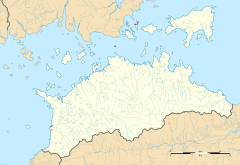Shido Station (志度駅, Shido-eki) is a passenger railway station located in the city of Sanuki, Kagawa Prefecture, Japan. It is operated by JR Shikoku and has the station number "T19".[1][2]
T19 Shido Station 志度駅 | |||||||||||||||||||||
|---|---|---|---|---|---|---|---|---|---|---|---|---|---|---|---|---|---|---|---|---|---|
 Shido Station in 2016 | |||||||||||||||||||||
| General information | |||||||||||||||||||||
| Location | 488-2 Shido Gosho, Sanuki City, Kagawa Prefecture 769-2101 Japan | ||||||||||||||||||||
| Coordinates | 34°19′17″N 134°10′23″E / 34.3215°N 134.1730°E | ||||||||||||||||||||
| Operated by | |||||||||||||||||||||
| Line(s) | Kōtoku Line | ||||||||||||||||||||
| Distance | 16.3 km (10.1 mi) from Takamatsu | ||||||||||||||||||||
| Platforms | 1 side + 1 island platform | ||||||||||||||||||||
| Tracks | 3 | ||||||||||||||||||||
| Construction | |||||||||||||||||||||
| Structure type | At grade | ||||||||||||||||||||
| Parking | Available but limited | ||||||||||||||||||||
| Accessible | Yes - bridge to platforms served by elevators | ||||||||||||||||||||
| Other information | |||||||||||||||||||||
| Status | Staffed - JR ticket window (Midori no Madoguchi) | ||||||||||||||||||||
| Station code | T19 | ||||||||||||||||||||
| Website | Official website | ||||||||||||||||||||
| History | |||||||||||||||||||||
| Opened | 1 August 1925 | ||||||||||||||||||||
| Rebuilt | 17 April 1998 | ||||||||||||||||||||
| Passengers | |||||||||||||||||||||
| FY2019 | 2,024 | ||||||||||||||||||||
| Services | |||||||||||||||||||||
| |||||||||||||||||||||
| |||||||||||||||||||||
Lines
editThe station is served by the JR Shikoku Kōtoku Line and is located 16.3 km from the beginning of the line at Takamatsu.[3] Besides local services, the Uzushio limited express between Okayama, Takamatsu and Tokushima also stops at the station.[4]
Layout
editShido Station consists of a side platform and an island platform serving three tracks. The present station building, completed in 1998 is a hashigami (橋上) structure where passenger facilities are located on a bridge which spans the tracks. The station entrance is on the north side of the tracks from where elevators and stairs lead to the bridge structure on level 2 which houses ticket gates, a waiting room and a JR ticket window (with a Midori no Madoguchi facility). From the bridge, separate stairs and elevators connect to all platforms. The bridge also connects to a second station entrance from road on the south side of the tracks, where there is a roundabout and parking lots for cars. A JR Travel Centre (Warp Plaza) is located on level 1 of the station building.[2][3][5][6]
-
The old station building as seen in 1991.
-
A view of the hashigami structure spanning the platforms and tracks. To the right is the station building. To the left is the island platform and the station south entrance.
-
The south entrance of the station.
History
editShido Station was opened on 1 August 1925 as the terminus of the Kōtoku Line was extended eastwards from Takamatsu. It became a through-station on 21 March 1926 when the line was further extended to Sanuki-Tsuda. At that time the station was operated by Japanese Government Railways, later becoming Japanese National Railways (JNR). With the privatization of JNR on 1 April 1987, control of the station passed to JR Shikoku.[7][8]
Surrounding area
edit- Sanuki City Hall
- Sanuki Municipal Shido Elementary School
- Sanuki Municipal Shido Junior High School
- Kagawa Prefectural Shido High School
See also
editReferences
edit- ^ "Shikoku Railway Route Map" (PDF). JR Shikoku. Retrieved 23 December 2017.
- ^ a b "志度" [Shido]. hacchi-no-he.net. Retrieved 25 January 2018.
- ^ a b Kawashima, Ryōzō (2013). 図説: 日本の鉄道 四国・九州ライン 全線・全駅・全配線・第1巻 四国東部エリア [Japan Railways Illustrated. Shikoku and Kyushu. All lines, all stations, all track layouts. Volume 1 Eastern Shikoku] (in Japanese). Kodansha. pp. 29, 67. ISBN 9784062951609.
- ^ "Shido Station Timetable" (PDF). JR Shikoku. Retrieved 21 January 2018.
- ^ "志度駅" [Shido Station]. shikoku.org.uk. Retrieved 25 January 2018.
- ^ "志度駅" [Shido]. JR Shikoku Official Station Website. Retrieved 25 January 2018.
- ^ Ishino, Tetsu; et al., eds. (1998). 停車場変遷大事典 国鉄・JR編 [Station Transition Directory – JNR/JR] (in Japanese). Vol. II. Tokyo: JTB Corporation. p. 648. ISBN 4-533-02980-9.
- ^ Ishino, Tetsu; et al., eds. (1998). 停車場変遷大事典 国鉄・JR編 [Station Transition Directory – JNR/JR] (in Japanese). Vol. I. Tokyo: JTB Corporation. pp. 215–216. ISBN 4-533-02980-9.
External links
edit- Shido Station (JR Shikoku)(in Japanese)

